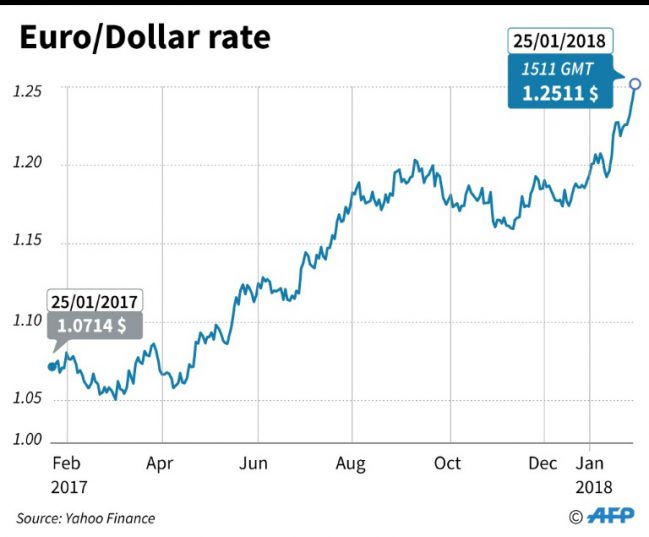SACP’s ‘hypocrisy’ slammed for backing Zuma and losing its socialist roots
It was an inauspicious start to Trump’s first foray as president onto the glitzy global stage at the World Economic Forum in Davos, Switzerland, as he was forced into damage control mode to calm skittish foreign exchange markets.
Trump told CNBC that remarks a day earlier by Treasury Secretary Steven Mnuchin, which seemed to favor a weak dollar to help US exporters, “were taken out of context.”
“Ultimately, I want to see a strong dollar,” Trump said, sparking a rally for the US currency, which had hit a three-year low against the euro earlier in the day, regained some ground after Trump spoke.
But the greenback was still below the level seen before Mnuchin’s remarks, which drew a sharp rebuke from Europe.
At 2200 GMT, the euro was at $1.2393, down a hair from a day earlier and well below its session peak of $1.254.
The furor underscored global concerns that the United States is taking a more adversarial approach towards its trading partners as part of its “America First” nationalist economic agenda.
– No change in policy –
“Obviously a weaker dollar is good for us, it’s good because it has to do with trade and opportunities,” Mnuchin said on Wednesday.
He then walked his comments back, clarifying that he was not signaling any change in US policy, as markets went haywire.
“I thought my comment on the dollar was actually quite clear… we are not concerned with where the dollar is in the short term,” Mnuchin told reporters.

Euro-dollar rate
“It is not a shift in my position on the dollar at all,” he said.
“In the longer term, we fundamentally believe in the strength of the dollar.”
But he nonetheless drew a sharp response from European Central Bank President Mario Draghi, who criticized the “use of language” that could upset currency markets.
Quoting from an International Monetary Fund statement in October, Draghi said nations had agreed they would “refrain from competitive devaluations, and will not target our exchange rates for competitive purposes.”
That language has been standard for many years after the Group of 20 of the world’s major economies adopted the commitment amid the global financial crisis, to prevent a repeat of the actions of the early 20th century that prolonged the Great Depression.
It was an inopportune time for Mnuchin to weigh into currency markets as the dollar already had weakened since Tuesday, after Trump signed fresh protectionist measures against China and South Korea.
– ‘Nobody should be talking about it’ –
In the wake of the tough talk on trade, Mnuchin’s comments were widely interpreted as a possible green light to let the value of the dollar slide to make US exports cheaper, thereby taking aim at China and other trading partners.
The statement also deviated from a US tradition of treasury secretaries publicly favoring a strong dollar. A few of his predecessors defied that unspoken rule with comments that were open to interpretation — with similar consequences.
Given the sensitivity of currency markets to any statements from officials, perhaps the most significant point in Trump’s comments came when he said, “I don’t like talking about it because frankly nobody should be talking about it.”
Gregory Daco, chief US economist at Oxford Economics, warned that openly favoring a weaker US currency could spur “a race to the bottom.”
“Everybody wants to have a currency that’s more competitive than the dollar or their trading partner,” he told AFP. “It might be bold but it might not be the smartest move.”
But Joseph Gagnon, a senior fellow at the Peterson Institute for International Economics in Washington, told AFP he was pleased to see Mnuchin favoring a weaker dollar.
“A strong dollar has been very harmful and been going way too long,” he said.
Download our app and read this and other great stories on the move. Available for Android and iOS.